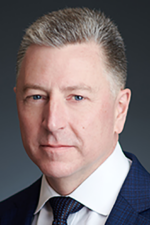Why Supporting Ukraine Advances the Rule of Law and Democracy

Scott Whitaker, President and CEO of AdvaMed®, recently spoke with former Ambassador Kurt Volker, a distinguished diplomat who served as U.S. Ambassador to NATO and U.S. Special Representative for Ukraine. He spoke with Scott, along with medtech CEOs, on critical geopolitical developments and trends, the potential impact of those trends on medtech, and the need to reach civilians with critical medtech amid war and sanctions.
The Russia-Ukraine conflict has a longer history than commonly perceived.
Ambassador Volker noted it’s important to put Russia’s 2022 invasion of Ukraine in the context of the Russian annexation of Crimea in 2014 and President Vladmir Putin’s vision of modern-day Russia. After the Soviet Union fell, Putin ended President Boris Yeltsin’s experiment with democracy, reestablishing an authoritarian system and state-run enterprises.
“[Putin] has had the goal of restoring the Russian Empire,” Volker said. “He has compared himself to Catherine the Great, to Peter the Great, saying that he is an accumulator of Russian lands. He feels that Ukraine belongs to Russia and that Ukraine is not actually an independent state or an independent people and identity, even though it predates Russia by hundreds of years.”
Since escalating the conflict, Russia has underestimated the strong will of the Ukrainians.
“Ukrainians are defending their homes, their lives, their loved ones, their families, their relatives, their villages. It is existential. So they will fight, and they will not give up.”
Russian morale is low, and “Russia is no longer in a position to advance.” However, predicting the end is tough, even for an experienced analyst.
“The thing that’s always most likely to happen is a continuation of what’s already happening,” Volker said. “It’s true every single day, right up until the day that it’s not. And then something changes. And the trick is to figure out what causes that change, not to predict what’s most likely.”
“Ukrainians are defending their homes, their lives, their loved ones, their families, their relatives, their villages. It is existential. So they will fight, and they will not give up.”
––Ambassador Kurt Volker
Sanctions work but must be applied universally, including humanitarian exemptions.
“Sanctions are most effective when they are universal and coordinated,” Volker said. “You’ve got to do the heavy lifting with the UK, with the European Union, with as many other countries as possible to have a common approach. And to do things where we’re doing one thing, the European Union is not, the UK is doing something else, that creates a vastly diminished impact.”
He agreed with the frustration from the medtech industry over the inability of U.S. companies to serve Russian hospital patients under a humanitarian exemption to sanctions while other countries are allowed to do so.
At a broader level, he emphasized that sanctions, especially coordinated sanctions, are an important tool in the policy toolbox and are having an impact. Russia is struggling to locate semiconductors for military equipment, resorting to “dumber bombs” and World War II-era equipment with lower success rates than newer equipment. Financial restrictions are having an impact. Russia has permanently lost its supply of oil and gas to Europe because Europe has invested in alternatives.
“The elites, the state-owned enterprises, the oligarchs, they’re taking a hit on this, and they don’t like it,” Volker said.
Organizations, such as NATO, work.
Sanctions are only part of the necessary components of pushing back on Russia. “You need the military aid for Ukraine. You need the unity of NATO,” Volker said.
NATO membership has grown, and countries such as Ukraine, given vague promises about NATO membership, are at a disadvantage.
“No one has ever attacked a NATO country because an attack on one is viewed as an attack on all, there would be a collective response, and it is just too much to take on. So, NATO has been successful at providing security, whereas these security assurances [given to Ukraine] have not.”
China is only interested in helping Russia to advance its own interests.
Volker’s take on the China-Russia bilateral relationship: “China couldn’t care less about Russia. They don’t respect Russia. They think they’re a decrepit criminal state. Anything that China wants from Russia, it can buy. China has its own interests. Sometimes they can be advanced by instrumentalizing Russia, sometimes not. And China will make its own decisions about what it sees.”
China’s interests include retaking Taiwan and shaping the global economic order in China’s favor, Volker said.
On Ukraine, “China actually has an interest in supporting sovereignty and territorial integrity because it wants people to believe that there is no choice for Taiwan other than to be reabsorbed into China someday because that is the one China policy. So, it supports Ukraine’s territorial integrity.”
When the war is over, China is positioning itself to make money by helping to rebuild Ukraine, Volker said.
U.S. support for Ukraine is key to reining in China.
While interest in supporting Ukraine may be waning in Congress and among the American people, continued support is important, Volker said.
If U.S. support for Ukraine flags, China will doubt the West’s will to help Ukraine and could exploit the void to seize Taiwan. Staying united for Ukraine is “a cautionary signal to China about Taiwan, saying, do this at your own peril.” Abandoning Ukraine would encourage authoritarian, aggressive regimes. “That’s not the signal we want to send.”
Why the Ukrainian conflict matters to U.S. interests.
“The U.S. is prosperous and successful and secure when we are in a global ecosystem that is secure and prosperous and democratic and rule-abiding and law-based and so forth. So, the European Union is still our largest trading and investment partner. We’re not going to have peace, prosperity, and a return to normal business as usual in Europe as long as Russia’s war against Ukraine continues.”

Ambassador Kurt Volker is a leading expert in U.S. foreign and national security policy with some 30 years of experience in a variety of government, academic, and private sector capacities. A former career member of the U.S. Senior Foreign Service, he worked in official capacities for over 25 years under six presidential administrations.
He was the US Special Representative for Ukraine Negotiations from 2017-2019, and US Ambassador to NATO in 2008-2009. He currently serves on the advisory board of Augustus, an artificial intelligence company, and has previously served as a Director of CG Funds Trust and the Wall Street Fund. Other Foreign Service assignments include working with Senator John McCain and the Secretary General of NATO.
From 2012-2019, Ambassador Volker was the founding Executive Director of The McCain Institute for International Leadership, a part of Arizona State University based in Washington, DC. He is a Senior Advisor at the Atlantic Council; a Trustee of the American College of the Mediterranean in Aix-en-Provence, France; a Trustee of the Hungary Initiatives Foundation; a member of the GLOBSEC International Advisory Board; and a member of the International Advisory Board of the U.S. Institute for Peace. He has taught Transatlantic Relations at The George Washington University Elliott School of International Affairs, and is a member of that School’s Board of Advisors.
Ambassador Volker contributes regularly to public policy debates, with appearances on BBC, Fox News, Al Jazeera, CNN, and with articles in such publications as the Washington Post, Foreign Policy, La Stampa, the Christian Science Monitor, Handelsblatt, and the American Interest, among many others.
Ambassador Volker has a B.A. from Temple University and an M.A. in International Relations from the Elliott School of International Affairs at George Washington University. He has studied in Sweden and France and speaks Hungarian, Swedish and French.
Hear Patient Stories
The Story of Medtech empowers patients to share their experiences with medical technology in an effort to educate, inspire, and create community.